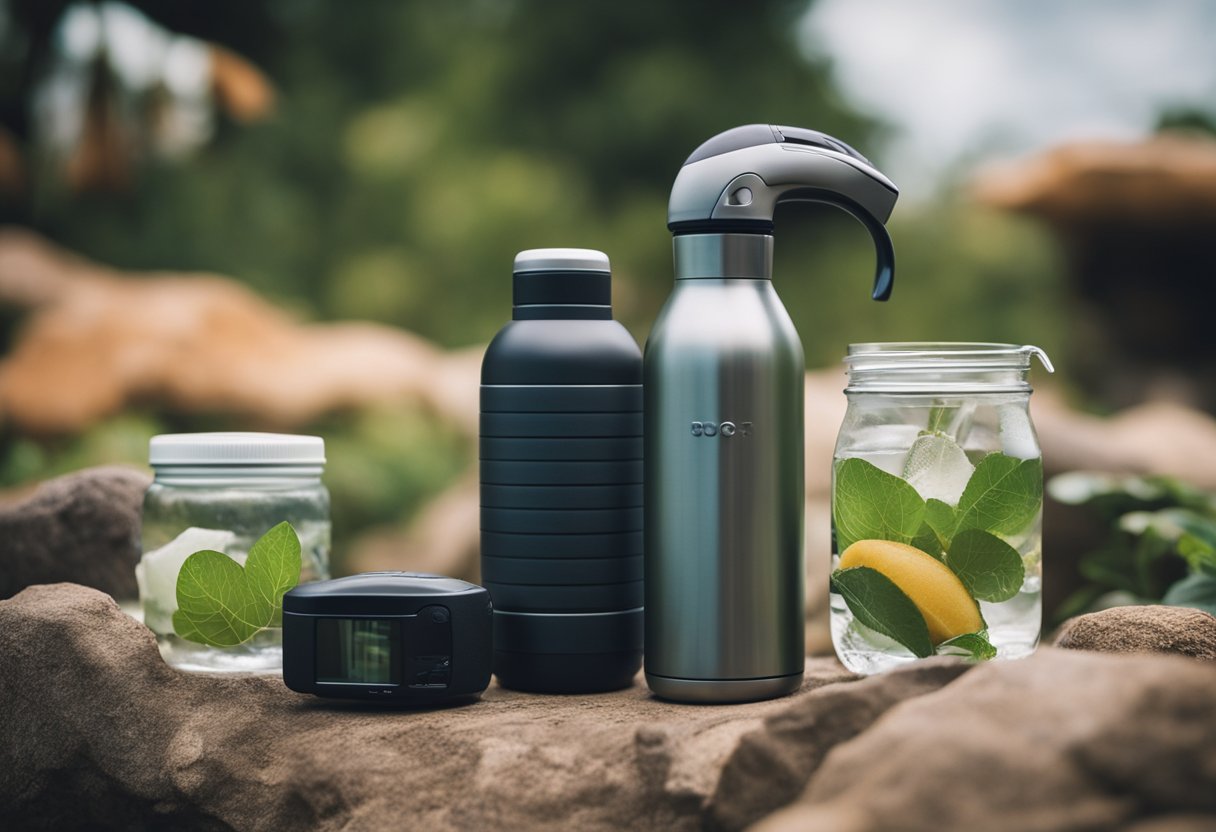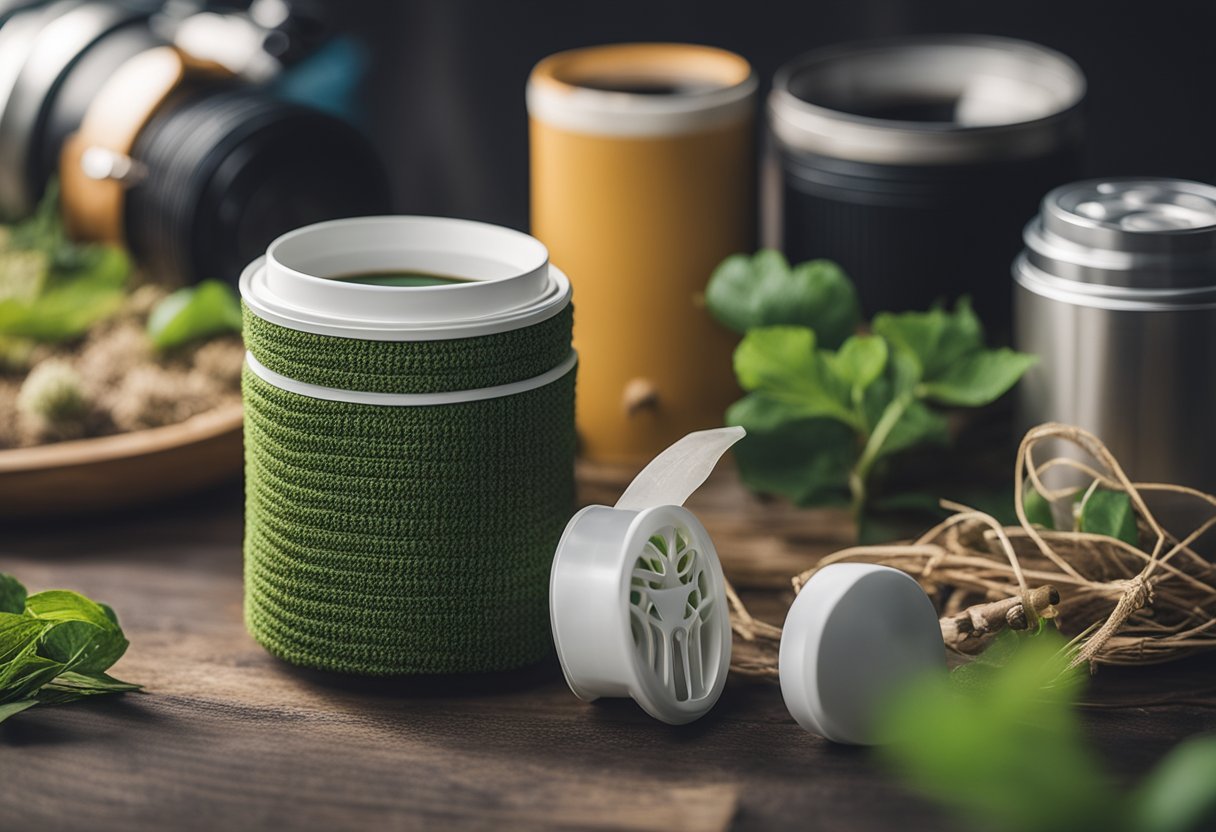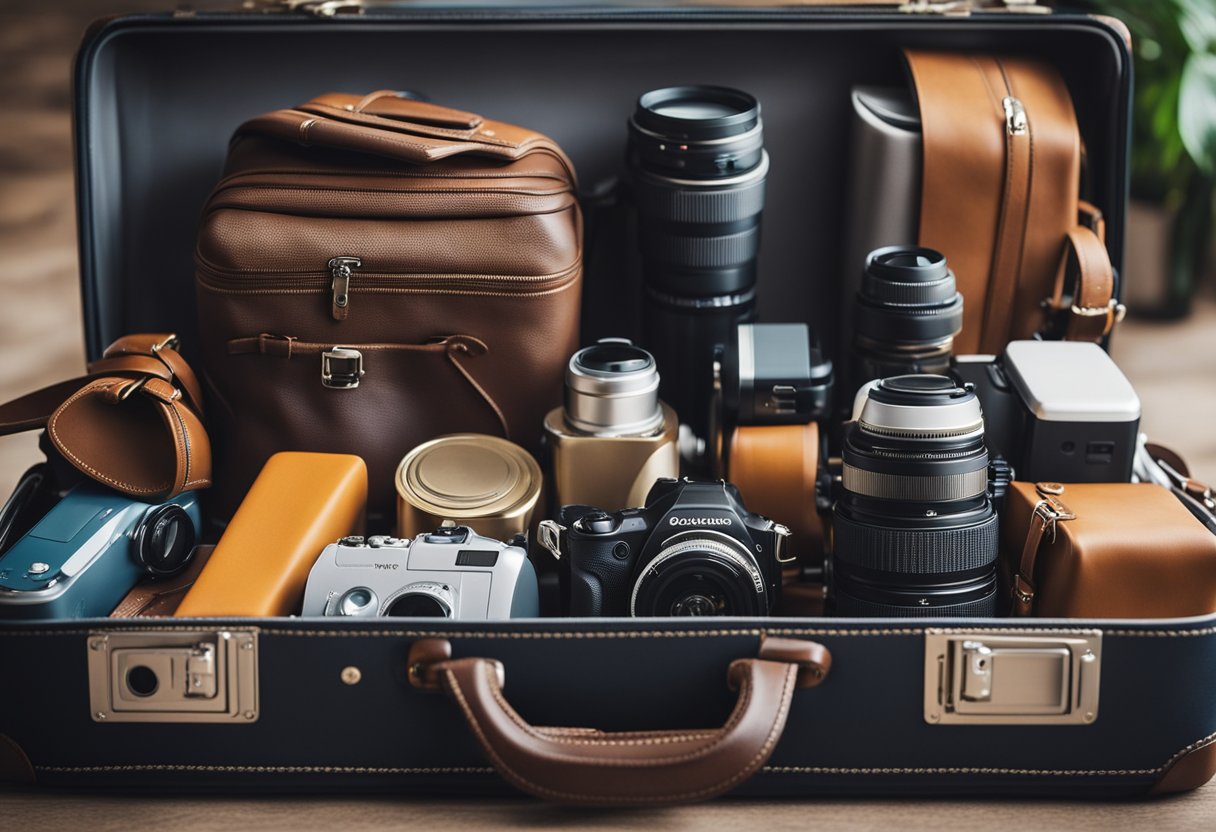Selecting Eco-friendly Travel Gadgets: A Guide to Responsible Tourism

Updated On: April 04, 2024 by Raghda Elsabbagh
Travelling with an eco-friendly mindset necessitates thoughtful consideration of the gadgets we carry. As explorers of diverse cultures and environmental stewards, we aim to minimise our carbon footprint while remaining sensitive to the communities we visit. Selecting travel gadgets that are both sustainable and culturally respectful is not just an ethical choice but a practical one, enhancing our travel experiences and ensuring that the places we treasure remain vibrant for future visitors.

In the realm of travel technology, we are fortunate to have innovative options that align with our sustainable values. Eco-friendly travel gadgets are designed to balance functionality with environmental responsibility, often utilising durable, biodegradable materials and cutting-edge technology to reduce waste and energy consumption. From solar-powered chargers to water purification tools, the choices available to the conscientious traveller can support both off-grid adventures and the well-being of the planet. Moreover, these choices show respect for local customs and contribute to the preservation of the cultures we encounter.
Table of Contents
Assessing Eco-Friendly Travel Gadgets

In our selection of travel gadgets, it’s crucial we focus on sustainability to minimise our carbon footprint and support environmental initiatives. Here’s how we carefully assess eco-friendly travel products.
Understanding Sustainability in Travel Products
When we consider sustainability in travel gadgets, we look at materials and manufacturing processes. Gadgets made from recycled materials or designed with solar energy capabilities help reduce reliance on non-renewable resources. For instance, solar-powered chargers are not only convenient for travellers but also beneficial for the environment, reducing the need for disposable batteries.
Measuring Environmental Impact
The environmental impact of a travel gadget can be quantified by examining its carbon footprint during its lifecycle. This includes production, use, and disposal. A product with a low carbon footprint is designed efficiently, uses minimal non-renewable energy, and is made from sustainable or upcycled materials. We strive to select gadgets that leave the least environmental impact, contributing positively to our planet’s health.
Certificates and Standards to Look For
To ensure that a product meets high sustainability standards, we look for certifications like the Energy Star rating or compliance with the Restriction of Hazardous Substances (RoHS) directive. Certifications such as Fairtrade can indicate that the producers of the travel gadgets are paid fairly and work in safe conditions, aligning with our values for both ecological and social responsibility.
In selecting gadgets that align with these principles, we directly support the larger environmental initiatives crucial for a sustainable future.
Durable and Sustainable Materials

When we consider eco-friendly travel gadgets, we are not just looking for temporary solutions but durable goods made from sustainable materials. These provisions support reduced waste and often have a smaller carbon footprint.
Recycled and Upcycled Materials
Recycled plastic is a cornerstone of sustainable travel products. By opting for items made from recycled content, such as PET bottles, we lessen our environmental impact. Products like the Solgaard Lifepack exemplify this, featuring materials diverted from ocean pollution equipped with solar panels for energy efficiency.
Natural and Renewable Resources
The use of bamboo epitomises the harness of natural and renewable resources due to its rapid growth and biodegradability. Organic cotton serves as another example, cultivated without harmful pesticides and synthetic fertilizers, thus presenting a gentler option for the environment. Items made from these materials offer a viable option for those looking to travel responsibly.
Vegan and Cruelty-Free Options
For travellers who are mindful of animal welfare, vegan and cruelty-free options have increased in availability. These products ensure no animals are harmed for our convenience, and they often utilise plant-based or synthetic materials that are equally durable and sustainable, aligning with a respectful and ethical approach to our global exploration.
Reusable Items and Accessories

In our efforts to travel sustainably, we’ve found that choosing reusable items is key. Not only do they cut down on waste, but they also offer an opportunity to show respect for local cultures.
Selecting Reusable Beverage Containers
Carrying reusable water bottles can significantly reduce our reliance on disposable plastic, which often ends up polluting the environment. We recommend investing in bottles with built-in filters or purification systems that can make local water sources safe to drink. This way, you’re prepared, whether sipping from a tap in a Parisian café or a stream in the Scottish Highlands. As for your morning brew, carrying a reusable coffee cup makes it easy to enjoy your coffee guilt-free without contributing to litter.
- Beverage Container Choices:
- Water Bottles: Look for BPA-free, lightweight designs.
- Coffee Cups: Insulated walls are a plus for keeping your drinks hot.
Alternatives to Disposable Toiletries and Wipes
To avoid single-use toiletries that contribute to waste, we’ve embraced alternatives like washable reusable makeup wipes. These can be easily cleaned and reused, reducing the need for disposable wipes that can take centuries to break down. Moreover, we pack reusable cutlery made of bamboo or stainless steel – it’s not just about eating comfortably but also about honouring the culinary traditions we encounter without disposable forks and spoons detracting from the experience.
- Toiletries and Wipes Alternatives:
- Makeup Wipes: We prefer ones made from organic materials.
- Cutlery: Choose sets that come with a travel case.
By considering these reusable alternatives, we show our commitment to preserving the environments we’re so keen to explore, and in doing so, we pay homage to the wonderful cultures that welcome us.
Biodegradable and Plastic-Free Alternatives

In recognising the need to respect cultural sensitivities while exploring the world, we advocate for the use of biodegradable and plastic-free gadgets. These alternatives are not only eco-friendlier but also conducive to a more authentic and respectful travel experience.
Plastic-Free Hygiene Products
Biodegradable materials in hygiene products are essential for environmentally conscious travellers. By choosing toothbrushes made from bamboo and soaps wrapped in paper, we avoid contributing to plastic waste that can be culturally insensitive in areas with limited waste management facilities. Look for products like biodegradable toiletry items that offer the same level of personal cleanliness without harming the environment.
Eco-Conscious Food and Drink Utensils
When dining, using utensils made from sustainable materials can demonstrate respect for both the environment and local customs. Opt for utensils made of bamboo or wood and straws that are either paper-based or metal and accompanied by a cleaner. For storage, consider silicone bags or beeswax wraps as alternatives to single-use plastic bags. Here is a good example of reusable and collapsible cups that can be easily packed and reduce our disposable waste.
Portable Energy Solutions

When embracing eco-friendly travel, we must consider how our gadgets are powered. Portable energy solutions that are both sustainable and culturally sensitive make it possible to stay connected without contributing to environmental degradation.
Choosing Solar Chargers and Power Banks
Solar chargers and power banks have emerged as a revolutionary way to keep electronic devices powered using the sun’s energy. We recommend selecting a solar charger that is efficient, durable, and made from renewable materials. It’s important for us to look for features like high conversion rates, robust construction, and portability. Investing in a solar power bank allows for energy storage, providing us with power even when direct sunlight isn’t available.
Consider the following when selecting a solar charger or power bank:
- Efficiency: Higher conversion rates mean faster charging times.
- Capacity: Ensures that the solar power bank can store enough energy for your needs.
- Portability: Compact and lightweight designs are preferred for ease of travel.
- Materials: Choose chargers made from sustainable or renewable materials to reduce your carbon footprint further.
Benefits of Solar-Powered Gadgets
Solar-powered gadgets offer several advantages that align with our values of eco-consciousness and cultural sensitivity. By harnessing solar energy, we’re able to utilise a renewable resource, reducing the reliance on fossil fuels and minimising our carbon footprint. Gadgets that run on solar power are not only environmentally friendly but also empower us to travel responsibly in areas where electricity is scarce, thereby respecting local resources and communities.
Key benefits of using solar-powered gadgets:
- Sustainability: Solar energy is clean and abundant, causing minimal impact on the environment.
- Convenience: Solar chargers provide power on the go, essential for remote locations.
- Cultural Consideration: Using renewable energy sources helps preserve local landscapes and resources, showing respect for the cultures and places we visit.
Incorporating solar chargers and power banks into our travel gear is a step towards sustainable travel. We’re making choices that not only benefit us but also the communities and environments we explore.
Micro-Electronics with Minimal Impact

In our selection of travel gadgets, we focus not only on functionality but also on products that have a low environmental footprint and respect cultural sensitivities. Our recommended devices are designed to work efficiently—utilising the latest technologies to minimise energy use—whilst ensuring that our presence as travellers remains unobtrusive within the locales we visit.
Low-Energy Bluetooth Devices
Bluetooth has become ubiquitous in low-energy communication between devices. We opt for gadgets that use Bluetooth Low Energy (BLE), which maintains the same communication range as classic Bluetooth but with significantly reduced power consumption. This conservation of energy is crucial as it allows for extended use without frequent recharging, making it ideal for travellers conscious of their environmental impact.
Eco-Friendly Navigation Tools
Navigating new places can be challenging, which is why GPS tracking is integral to modern travel. We emphasise solar-powered chargers to ensure that these essential navigation tools are always functional without relying on non-renewable energy sources. By harnessing solar energy, we can power GPS devices sustainably, thereby reducing our carbon footprint as we explore different cultures around the globe.
Water Purification and Efficiency

In the realm of eco-friendly travel, ensuring access to clean drinking water while minimising environmental impact is paramount. Our focus on water purification and efficient usage highlights the importance of selecting appropriate gadgets that respect both the environment and cultural sensitivities.
Choosing Water Purifiers for Safe Hydration
For the conscientious traveller, a portable water purifier is an essential companion. Options like the LifeStraw offer individual filtration solutions that are compact and effective against waterborne pathogens. It’s imperative that we choose purifiers like the LifeStraw water purifier, reputed for its efficacy in filtering out parasites and bacteria, ensuring our travels do not contribute to the plastic waste challenge.
Another fine example is the GRAYL Geopress 24 oz Water Purifier. It boasts a design that not only purifies water but does so quickly, removing viruses, bacteria, and even chemicals. This all-in-one bottle makes it particularly suitable for situations where access to clean, potable water is uncertain.
Efficient Usage of Water Resources
Efficiency in using water resources must go hand-in-hand with purification. We must be judicious in using water, avoiding wastage, and understanding local water scarcity issues where we travel. This is not just about how we purify water but also about how we conserve it. The day-to-day decisions we make, from opting for showers instead of baths to using a reusable water bottle, can significantly reduce our water footprint.
Portable water purifiers are especially valuable as they can transform various water sources into safe drinking water without necessitating a new bottle each time. Such innovations mean that we contribute to preserving local water reserves and respecting the natural balance of the places we visit. Through mindful usage, we ensure that our travel is eco-friendly, culturally sensitive, and sustainable.
Eco-Friendly Personal Care Products

When embarking on travels, we often face the challenge of maintaining our personal hygiene without compromising on our commitment to the environment. The use of eco-friendly personal care products is a simple yet impactful way to address this concern.
Solid and Bar Alternatives to Liquids
Replacing liquid toiletries with solid alternatives is a smart choice for both convenience during travel and environmental conservation. Shampoo and conditioner bars are compact and spill-proof, eliminating the need for plastic bottles and reducing waste. They often come in paper packaging, which is readily biodegradable or recyclable. Moreover, travelling with solid toiletries means we adhere to TSA regulations effortlessly, supporting a hassle-free journey.
Skincare for the Environmentally Conscious
When nurturing our skin, biodegradable sunscreen and natural insect repellent emerge as essential items in our eco-friendly kit. Biodegradable sunscreen, devoid of harmful chemicals, protects marine life when we swim, as it doesn’t contribute to coral bleaching. Insects are deterred by repellents made from natural ingredients, which are gentle on our skin and the environment. By opting for plastic-free toiletries, we ensure that our travels leave minimal footprints on the ecosystems we explore.
Travel Gear and Apparel
When packing for eco-conscious travel, the gear we choose plays a crucial role in our journey’s environmental impact. Opting for sustainable options in both apparel and accessories not only benefits the planet but also respects local cultures.
Sustainable Fabric Choices
Backpacks and travel towels made from sustainable materials can greatly reduce our carbon footprint. GOTS-certified organic cotton is one of the most eco-friendly options available for both clothing and gear, as it’s produced without harmful pesticides or chemicals, preserving both the environment and our health. When selecting apparel, we also look for labels like recycled polyester or Tencel, which are produced through more eco-friendly processes compared to conventional fabrics.
Eco-Friendly Bags and Luggage
Choosing sustainable luggage can mean opting for bags made from recycled materials, boasting durability without compromising on style. A sturdy backpack made from sustainable materials can serve as a responsible travel companion, often featuring clever designs that maximise space while being lightweight. We also appreciate multipurpose items that reduce our need to buy and pack more. For instance, a luggage item doubling as a day bag is a boon for eco-minded travellers.
In our pursuit of responsible travel, looking for items that align with both eco-friendly and culturally considerate practices is paramount. We embrace luggage that doesn’t just look good but does good, celebrating craftsmanship that supports local communities and preserves traditional methods.
Supporting Communities and Cultural Respect

In our travels, we have the opportunity, and indeed the responsibility, to positively impact local communities and honour cultural traditions. Here’s how to approach eco-friendly travel with a mindset rooted in respect and social responsibility.
Engaging with Local Traditions
When visiting new places, engaging with local traditions is a profound way to connect with the community. We recommend attending cultural events and purchasing authentic crafts directly from artisans. This not only supports the local economy but also helps in preserving the unique cultural identity of the destination. It’s important to do so with sensitivity and mindfulness, ensuring our interactions are welcomed and appropriate.
Choosing Socially Responsible Brands
Selecting eco-friendly travel gadgets from socially responsible brands is crucial for sustainable tourism. We look for companies that implement ethical labour practices, use sustainable materials, and actively participate in community development programs. Supporting such brands highlights our commitment to social responsibility, facilitating positive change and encouraging others to think and act sustainably on their travels.
Eco-Conscious Packing Strategies

In our pursuit of sustainable travel, we must approach packing with a mindset that embraces both efficiency and environmental responsibility. The choices we make in packing can significantly reduce our carbon footprint and contribute to a more sustainable tourism industry.
Efficient and Minimalist Packing
We advocate for the use of packing cubes to organise belongings and optimise suitcase space, ensuring we pack only what’s necessary. This not only reduces luggage weight, which is beneficial for fuel efficiency in transit, but also enables us to move with greater ease, allowing for a more authentic travel experience. We should focus on multi-functional clothing and travel-sized toiletries to minimise waste and avoid the need for single-use plastics.
Documenting Travels Sustainably
Opting for a digital travel journal can be an eco-friendly alternative to paper-based diaries. For those of us who value the tactile element of journaling, selecting a notebook made from recycled materials aligns with our sustainable ethos. In documenting our adventures, we strive to leave the lightest possible footprint, ensuring that we respect the communities and environments we visit.
Concluding Remarks on Sustainable Travel Choices
We safeguard the natural habitats we explore by integrating eco-friendly travel products into our journey, such as biodegradable soaps or reef-safe sunscreens. Our packing strategy directly influences the quality of the authentic experiences we seek. Embracing these responsible practices, we enrich our travels and support the preservation of the cultural sensibilities and ecological balance of the destinations we cherish.
Frequently Asked Questions

In our pursuit to travel mindfully, we often encounter questions about eco-friendly and culturally sensitive practices. Here, we address these frequent inquiries to assist you in making informed choices for your sustainable travel adventures.
How can one identify travel accessories that are both environmentally friendly and culturally sensitive?
Identifying travel accessories that honour both environmental and cultural considerations involves looking for products with a clear eco-friendly ethos. Opt for items that use sustainable materials, adhere to fair trade principles, and have a minimal environmental impact. Check whether the companies are transparent about their manufacturing processes and actively engage in respecting cultural diversity.
What should be considered when selecting sustainable toiletries for international travel?
When selecting sustainable toiletries for international travel, consider products with biodegradable ingredients, plastic-free packaging, and vegan or cruelty-free certifications. To respect local customs, educate yourself on regional sensitivities and choose products that align with local cultural norms.
Which companies are known for providing eco-conscious travel gear?
Companies known for providing eco-conscious travel gear include those specialising in responsible production methods and ethical business practices. These brands typically utilise renewable materials, reduce waste, and contribute to conservation efforts. Research brands with positive reviews and certifications from recognised sustainable organisations.
In what ways can travellers ensure their journey contributes to sustainable tourism practices?
Travellers can contribute to sustainable tourism practices by supporting local economies, being mindful of their impact on the environment, and embracing eco-friendly travel options. Choose accommodations and services that have a proven commitment to sustainability, and always endeavour to leave a positive footprint in the places you visit.
What are some examples of sustainable travel that incorporate respect for local customs and traditions?
Sustainable travel examples that respect local customs include engaging in community-based tourism, participating in culturally aware guided tours, and attending festivals that celebrate local traditions. By immersing oneself in the lives and customs of the host community, travellers can experience authentic cultural exchange while supporting preservation efforts.
How can travellers reduce their carbon footprint while respecting cultural norms when choosing transportation?
To reduce the carbon footprint without compromising cultural norms, opt for more eco-friendly methods of travel, such as trains or public transport, over short-haul flights. When unavoidable, choose direct flights or airlines with carbon offset programmes. Consider renting electric or hybrid vehicles, and where appropriate, integrate local modes of transport that are culturally significant.






